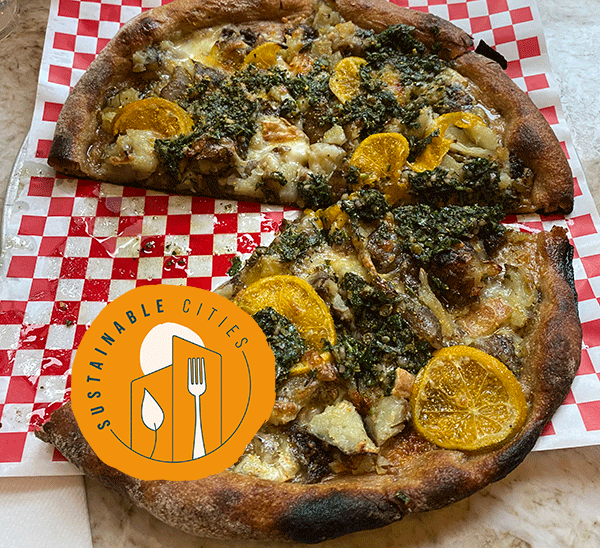![]() This article is part of a new series by Wicked Leeks, Sustainable Cities, exploring what sustainable food means to those living in the city.
This article is part of a new series by Wicked Leeks, Sustainable Cities, exploring what sustainable food means to those living in the city.
The restaurant is an urban phenomenon fuelled by the rural. In a world where the links between the city and the not-city are becoming ever more frayed, this is a quality that puts it in a rare category of urban infrastructure that acts as a portal to what is outside of it.
To visit a modern restaurant increasingly means to engage with, not just how your food was made and the techniques by which produce becomes food, but how it was grown, and who grew it too.
It didn’t always used to be this way. Indeed, up until recently the restaurant was in a category in which you might also place the supermarket: an urban phenomenon that dictates the rural.
To be the best restaurant you bought the best produce, which actually meant you bought whatever the best chef thought the best produce is, or rather, what the best chef thought the best audience might think was the best produce. This chef-driven, or audience-driven cuisine is now known to be unsustainable to the planet: at the high end you have practices like foie gras production and flying in meat from all over the world, and at the lower, overfishing of popular fish like cod and salmon at the expense of lesser-known species.
There is a phrase that has come to sum up the shift in the cuisine that the most progressive restaurants serve, and that is ‘produce-led’. It’s a slightly awkward phrase (isn’t all food led by produce, you might wonder?) but it does describe something specific, an evolution of a style of cooking in this country which you might say started in the 90s with ‘nose to tail’ but really stretches back centuries, of creatively making the best of what is available, rather than trying to make everything available.
You can see it in Pam Yung’s attempts at (now defunct) Flor in London’s Borough Market to make a pizza with British cheese to mimic low moisture mozzarella rather than import something Italian; in the way 40 Maltby Street and Lighthaus Café’s blackboard menus ebb and flow in seasons that last two to three weeks rather than months; in bakeries like Landrace in Bath and Hamblin in Oxford that prioritise making bread from grains that grow well in this country, not just those that taste good; in how, in a trip last year to NamaYasai farm in Sussex, I came across staff from eight different London restaurants either visiting or working there; and in how growers and farmers are listed as collaborators on menus. You might even call it producer-led.

This link between chef and producer is a more sustainable way of working, although it would be a stretch to call it the key to a sustainable future. The restaurant is only a small part of the food system, and these restaurants an even smaller part of that.
We know that from the long hours to the unpaid labour, from the way they can price people out of neighbourhoods, to their new dependence on the precarious service class of delivery drivers, that the restaurant is not a particularly sustainable entity. Indeed, as a restaurant writer, the only time I’ve felt like I’ve been eating sustainably in the last few years was the few months after the start of the pandemic, when all the best produce usually reserved for restaurants became affordable to eat every day. But they do act as portals of another sort, between the cutting edge of agriculture and the eater.
It is the new job of restaurants, perhaps, to trial out these sustainable ideals and show that they are commensurate with quality, health and taste, provoking us not simply to eat are more ‘sustainable’ restaurants but advocate for changes in our own lives and the lives of others. It is only when the producers are leading everyone, not just a select few, that something close to sustainable can be realised.
















0 Comments